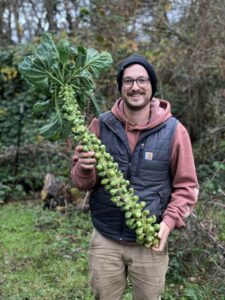Clint Taylor
I grew up in a small rural town in East Texas, deep behind the piney wood curtain in a land dominated by giant loblolly pines, muddy windy rivers, and air so thick and humid it felt like you were wearing it. When was a teenager I mowed lawns and fixed up garden beds. One client I had, Miss Trixie, was getting on up in her years. She had an amazing green thumb but her age had was limiting her mobility. She would coach me through everything I did – pulling weeds, planting annuals, pruning, and fertilizing. She left me with a love of horticulture that I will carry until the end of my days.
I enriched that love by getting a BS in Horticulture at Texas A&M. While I was there I worked as a student worker for a rose and peach breeder. It was where I first learned about the land grant system and the mission of extension, and I thought at the time that is sounded like a really fun job. I also met my wife through that job. She was a horticulture student as well, and she worked on the roses and I worked on the peaches. We just never stopped hanging out, now we have been married for almost 10 years.

After I graduated from Texas A&M I enrolled in a Masters International program at Oklahoma State University. The program merges graduate school and serving in the United States Peace Corps into one. After a little over a year of studies at OSU my wife and I were sent to Panama to serve as volunteers in an indigenous community deep in the rain forest near the Columbian border. My time in the Peace Corps was good, but also very challenging. We lived in one of the most remote sites of any of Peace Corps Volunteer in the world at that time. Illness and isolation were persistent challenges, but it was very rewarding work. We taught home gardening, and worked on clean water projects. When we left many folks in our little village of 100 people were growing their own veggies for the first time.

When we returned from Panama, I took a job for a year working for Texas A&M Extension and Research doing an irrigation trial on dent corn in the high desert of Arizona. I lived and worked on a couple 1000 acre farm and learned a great deal about irrigation. A family illness brought us back to East Texas, and we became teachers. We taught high school biology and environmental science for 5 years. We used our summer breaks and holidays to build a house. Little by little we built the whole thing ourselves in cash over 4 years. After resting for 1 year we decided that we were tired of living in such a hot and humid place and decided to pack up and move “somewhere you can see mountains”. In June of 2019 I got a job working for the Small Farms Program here at NWREC and we moved to the great Pacific Northwest and never looked back.
Living and working in the Willamette valley is such rewarding experience. It is truly a horticultural paradise, with some world class soils and growers. I get do something a little different every day, sometimes installing research trials or putting together workshops for growers, and there are always endless opportunities to hone my horticultural skills.

